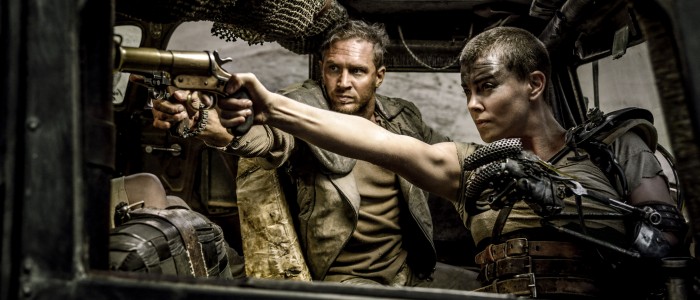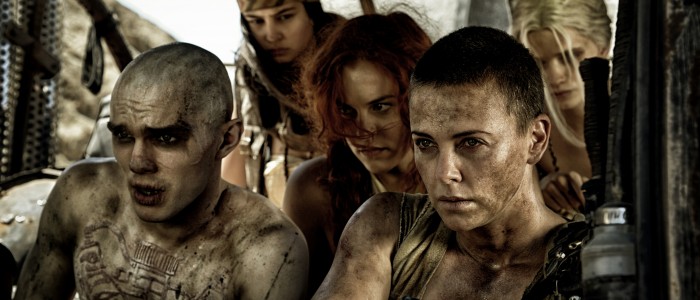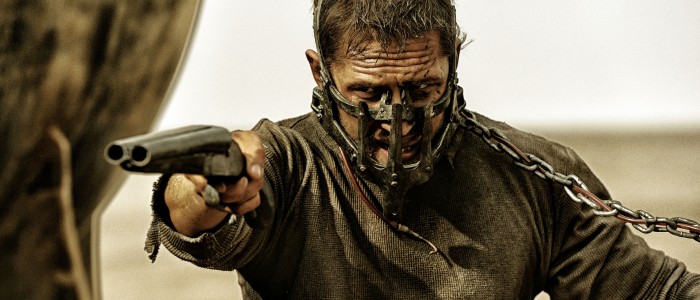The Heroic Masculinity Of 'Mad Max: Fury Road'
In a typically testosterone-heavy summer movie season, Mad Max: Fury Road stands out for its unapologetic feminist streak. Most obviously, this is manifested in the compelling female characters, and the (apparently, distressingly) radical notion that women are not property.
But the film has just as much to say about men — specifically what masculinity is, and what place it has in our society. At the center of the film are two types of masculinity: the toxic, destructive kind represented by Immortan Joe, and the healthy, productive kind represented by Max. The conflict between them drives the movie, and points a way forward for our world.
(Warning: Major spoilers follow for Mad Max: Fury Road.) 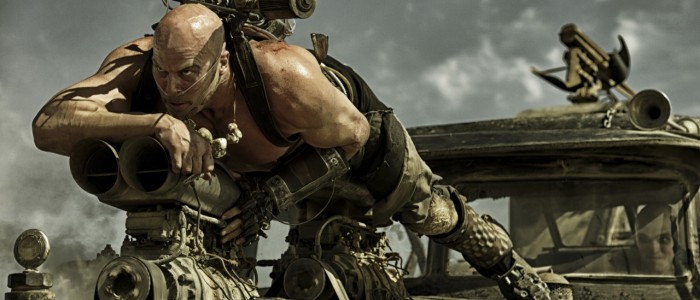 Mad Max: Fury Road in ContextMad Max: Fury Road arrives in a culture with contradictory views of masculinity. On the one hand, traditional masculinity is glorified. Our sports stars and political leaders are mostly men, and we worship at the altars of Ron Swanson and Captain America. Even toxic masculinity is admired, to an extent – it's what the entire wave of dark antihero prestige dramas was based on.
Mad Max: Fury Road in ContextMad Max: Fury Road arrives in a culture with contradictory views of masculinity. On the one hand, traditional masculinity is glorified. Our sports stars and political leaders are mostly men, and we worship at the altars of Ron Swanson and Captain America. Even toxic masculinity is admired, to an extent – it's what the entire wave of dark antihero prestige dramas was based on.
On the other, that same culture cautions us that traditional masculinity is dangerous. The underlying message of "boys will be boys," that hand-wave-y excuse for everything from petty crime to rape to violent assault, is that men just can't help themselves. And that when men don't help themselves, we get Elliot Rodger, Ray Rice, Gamergate, Steubenville.
Generally speaking, everyone agrees that heroism is good, and that rape and murder are bad. But on a specific, day-to-day level, it can be frustrating to figure out what role, exactly, masculinity should play in our society. Luckily, Mad Max: Fury Road offers a roadmap for the modern man.
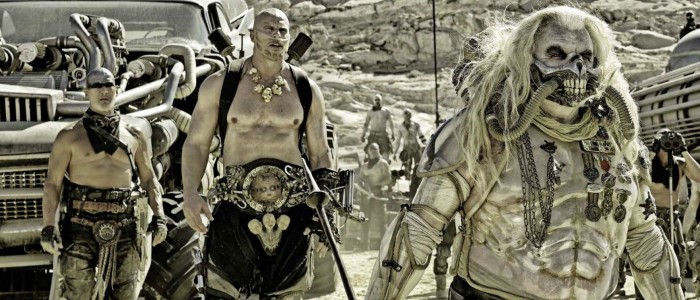 Heroic Masculinity vs. Toxic Masculinity
Heroic Masculinity vs. Toxic Masculinity
All of the major male characters in Mad Max: Fury Road are manly men, in every stereotypical sense. They're strong, silent types who are good at fixing engines, firing guns, and hitting people. What separates the good ones from the bad ones is what they use that masculine power for.
The villains use their strength to destroy and subjugate. A recurring refrain in the movie is "Who killed the world?" The answer is: bad men like Immortan Joe and his War Boys did. They treat women like property to be prized and machines to be used. They let the masses die of thirst, doling out just enough water to keep the survivors in their thrall.
The heroes, on the other hand, use their strength to support and build. Max and eventually Nux throw themselves into helping the escaped sex slaves, who just want to be treated like people. As the story goes on, when Max and Nux fight, it's to protect themselves, the people they care about, and the cause they're devoted to. When Immortan Joe and his War Boys do, it's because they're upset they cannot treat humans as property.
Toxic Masculinity vs. Men
It is immediately obvious that the toxic culture established by Immortan Joe is harmful for women, but Mad Max: Fury Road makes a point of showing us that it's no picnic for men, either. Nux and his War Boy brethren aren't enslaved like the women are, and they're entrusted with guns and cars. However, they're similarly treated as objects — as weapons and tools — rather than people.
In the midst of one battle, a leader wonders aloud, "All this for a family squabble?" There's a bit more to it than that — healthy babies are apparently hard to come by in this world, making strong breeders and viable fetuses valuable. But Immortan Joe's fight certainly isn't about the sanctity of life; he's perfectly willing to let dozens of his followers die for him.
What keeps the War Boys in line isn't locks or chains, but something more insidious. Immortan Joe has manipulated them into worshipping him, to the extent that they believe dying for his cause is their ultimate calling. Even when Immortan Joe isn't around, that warrior mentality is reinforced by other War Boys, who follow his lead and promote a culture of violence, destruction, and aggression.
Within the confines of War Boy culture, it's hard to imagine a different way. But we, as the audience, get to see a different way, as Max and Nux continue their journey with the women (i.e., Furiosa, the wives, and the Vuvalini). Notably, Max and Nux don't take charge, and they don't expect sex or power in return for their services.
It's a depressingly common trope for white male characters to come charging into a situation they know nothing about, and immediately become the One who can fix everything. (See: The Matrix, The Lego Movie, The Maze Runner, etc.) So it's refreshing that in Mad Max: Fury Road, Max and Nux realize this isn't their mission, that they're there to help instead of lead.
Mad Max: Fury Road also bucks the trope of the action hero "getting the girl." Yes, Max and Nux befriend Furiosa and Capable, respectively. But there's never any expectation that these women, or any others, owe them sex or romance. Contrast that to Skyfall, in which James Bond is rewarded with sex after rescuing a woman from sexual slavery.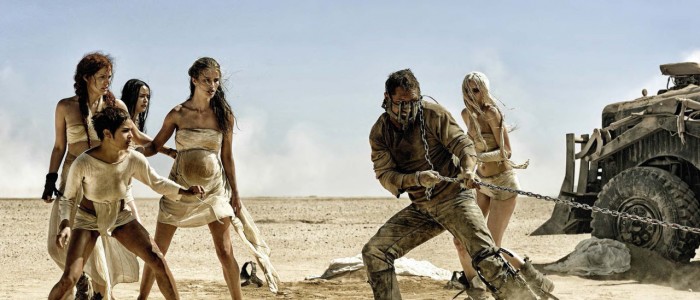 Heroic Motivations
Heroic Motivations
This isn't to say Max and Nux submit blindly or become emasculated. The film never takes away their agency. Max offers a better suggestion when Furiosa embarks on what he can see is a fool's errand. Nux switches sides of his own volition, not because Furiosa or anyone else forced him to. But it's rare to see white male action heroes willing to let someone else drive, metaphorically and literally.
So if they're not getting sex, love, or even gushing gratitude for their services, what are they getting out of all of this? Well, the same thing the women are. They get to fight for a cause they care about (or at least, come to care about) alongside people they care about. They get to tear down a society that has used them for ill. Since the movie never robs Max and Nux of their power, it's clear they find this to be a perfectly satisfactory deal.
Men Giving LifeMad Max: Fury Road also flips on its head the idea that masculinity equals destruction, while femininity equals nurturing and creation. Here, the women aren't the only ones who can give life. From the start of the film, what makes Max extra valuable is his type-O blood — he's a universal donor. And his heroic journey culminates in a scene where he literally gives life, by injecting blood into Furiosa's veins to bring her back from the brink of death.
This wouldn't be an option for all men (blood type compatibility and all), and it's not Max's doing that he has type-O blood. Still, it suggests masculine heroism need not solely be about destroying bad guys — it can also be about saving good guys (or good gals, in this case). Nux may not be able to contribute in the same way Max can, but he willingly gives his life so that the others can live.
Meanwhile, Mad Max: Fury Road takes jabs at the cultural association between femininity and life-giving. The female characters in this film are capable of both great destruction and great creation. Sometimes the person doing the destroying and the creating is even one and the same, like the warrior woman who carries plant seeds while distributing "anti-seeds" (bullets) to those who would harm her.
While Max embodies a positive masculinity throughout the film, Nux very notably does not. His transformation is hard earned. First he fails, repeatedly, to live up to Immortan Joe's ideals, and then he begins to see Immortan Joe's promises of glory for the empty lies that they are. Meanwhile, he comes to see the wives as people instead of property. Only then does Nux come around to Furiosa's side.
Contradicting Max's lament that "hope is a mistake," Nux is a ray of hope in this movie. His evolution is a reminder that people can change, and that good and bad are not static traits but choices offered to everyone. When he dies, he does so while fighting for a righteous cause, and he leaves behind people who will miss him. It's a stark contrast from the dozens of anonymous War Boy casualties.
The hope represented by Nux is reinforced later in the film, when our remaining heroes return to the Citadel. The men in power at a loss for what to do, and it's the younger War Boys — actual boys, still in training — who choose to let Furiosa and her women ascend. Again, there's a suggestion there that all is not lost. Even people raised in a toxic culture can change their ways.
In barest terms, the objective in Mad Max: Fury Road is to smash the patriarchy. But what makes this patriarchy so vile isn't men per se, or masculinity itself — it's what these men choose to do with their masculine power. The "breeder" women declare "Our babies will not be warlords," not "our babies will not be male."
Nor do the female characters demonstrate any knee-jerk dislike of men. While they strike back at men who would hurt them, they're quite welcoming toward men who don't. In turn, the good men are neither threatened by these women's power, nor eager to take advantage of their vulnerability. They understand that a woman's strength doesn't devalue their own.
Mad Max: Fury Road isn't about a battle of the sexes. It's about a better way forward. Immortan Joe's world is a vicious hierarchy, where the strong are encouraged to prey on the weak. The women represent a more egalitarian world, where people see each other as (gasp) people, not sex toys or war machines, and work together to build a better society.
In the real world, the struggle between the two models isn't quite so dramatic or action-packed. And the specific heroic actions taken by Max and Nux don't really apply here. (It's unlikely any modern man will have the need or opportunity to engage in fistfights atop a moving oil rig.) What Mad Max: Fury Road does is suggest a new way of thinking about masculinity, in which it's used as a way to empower, rather than oppress.

